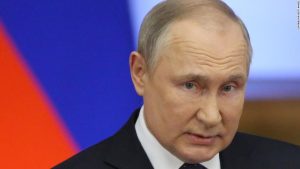

But Russia’s bombastic move is a bluff that, should the European Union play its cards right, will backfire spectacularly.
The EU shouldn’t blink — or let itself be caught on its backfoot again. It should implement a full-scale oil embargo, as European Commission president Ursula von der Leyen has proposed, which will damage Russia much more than Europe. It would not only hinder the war effort by slamming the Russian economy — it would send the unequivocal message that the West stands behind Ukraine and is willing to pay a substantial price to thwart Russian aggression in Europe.
And the sooner it happens, the better.
It appears Putin hopes that, as he ratchets up the pressure, some EU countries will split with Brussels and abandon the coalition that, thus far, has held firm in the face of Russian threats. Hungary and Slovakia, for example, have intimated that Russian energy is dearer to them than solidarity with Europe or Ukraine.
“Europe is already rapidly diversifying its gas sources and working toward establishing energy sovereignty,” R. Andreas Kraemer, founder of the Berlin-based think tank Ecologic Institute, told CNN Business’ Perspectives. “The key is gas-use efficiency and the substitution of gas by electricity in the short run and, in the longer term, synthetic gas from ever cheaper and more abundant surplus renewable power.”
How an oil embargo will hurt and help
Oil is a cash cow for the Russian economy. Every day, Russia sells 2.4 million barrels of crude to Europe, which accounts for a ginormous $20 billion oil bill paid to Russia since the war’s start. This is why von der Leyen’s proposed freeze — to end imports of crude oil in the next six months and of oil products by 2023 — would punish the Putin regime.
Economists calculate that an oil embargo would hit the already-reeling Russian economy with considerable force. While the war effort is financed above all in rubles, such a fall in export revenues would devastate Russia’s foreign exchange earnings. Russia may find itself unable to fulfill its foreign currency obligations, causing it to default on international loans, further isolating Moscow in the global financial system. Russia pays its 20,000 foreign soldiers in foreign currency and, of course, many of its imports, too.
Certainly, going cold turkey would reverberate negatively on the European populace and economy, sending oil prices even higher. If countries like Slovakia and Hungary cooperate, their European allies will certainly come to their aid, as they are to Poland and Bulgaria. The European economy would survive while Russia’s — and hopefully the Putin war machine with it — would be crippled. This, surely, is worth the interim hardship.

